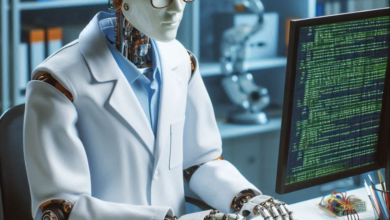Tech Focus: Leveraging Generative AI for Industrial Environment

Del Costy, President and Managing Director at Siemens Digital Industries (Plano, TX), unveiled how the company is making automation easy with their first generative AI-powered product for engineering in an industrial environment at the second day Automate 2024 keynote. The newly launched Siemens Industrial Copilot —a generative AI-powered assistant — will optimize engineering and support operations.
“Siemens sees a huge potential in GenAI and we really want to ensure we apply it to industry and that we make it industry-relevant,” said Bernd Raithel, Director of Product Management and Marketing and Deployment of New Technology in the Factory Automation business unit of Siemens Industry at the company’s press conference held later in the day. “With the Siemens Industrial Copilot, we will empower people to optimize processes and boost productivity along the entire value chain of industries.”
“When we ask ChatGPT a question today and a week later, we might get different answers. That’s not good for the industry. What we are doing is enhancing co-pilots to be ready for the industry and also be predictable and stable. We are building different copilots for design, planning, engineering, operations, and services,” said Raithel.
Raithel gave an example how a copilot for planning can improve the factory layout. “Our tools can simulate the layout and then the copilot can give ideas on how to optimize it. All of this can be done in a virtual environment.”

The Siemens Industrial Copilot is also seamlessly connected to the Totally Integrated Automation (TIA) Portal. This will enable engineering teams to find the right help topic and to generate a basic visualization and code faster for programmable logic controllers (PLC). As a result, they will be able to significantly reduce their workload and offload repetitive tasks to the Siemens Industrial Copilot. In addition, the engineering of complex tasks will become less susceptible to errors. This in turn reduces development times and boosts quality and productivity over the long term.
Features of the new Siemens Industrial Copilot for TIA Portal Engineering include automated code generation in structured control language (SCL): The TIA Portal can take the code suggestion directly from the AI, eliminating the need to copy and paste. It’s also possible for the Siemens Industrial Copilot to explain SCL code blocks or to guide and easily create an initial machine or plant visualization. In addition, engineering teams can search Siemens manuals in natural language.
“The real power comes when you go into process description. When you take that and paste it in a copilot, it creates an entire process flow. It can be much faster in creating a program for you,” said Raithel.
Industrial Copilot is also key to addressing the qualified workforce shortage. “It solves a workforce challenge we have with new engineers coming in. It helps to accelerate the learning curve for them,” he added.
Overall, the generative AI-powered assistant will assist in optimizing the engineering and operation lifecycle. From the planning phase to validation, generating unit tests of function blocks, monitoring to optimizing machine performance, the Industrial Copilot will make human-machine interactions faster, more intuitive, and more efficient.
Siemens is also paying close attention to security, said Raithel, and working with its customers to make sure their data doesn’t leave the platform.
The first version of the Siemens Industrial Copilot will be released in July 2024.
Automate Booth #1841
For more information, visit www.sw.siemens.com/en-US/ .



